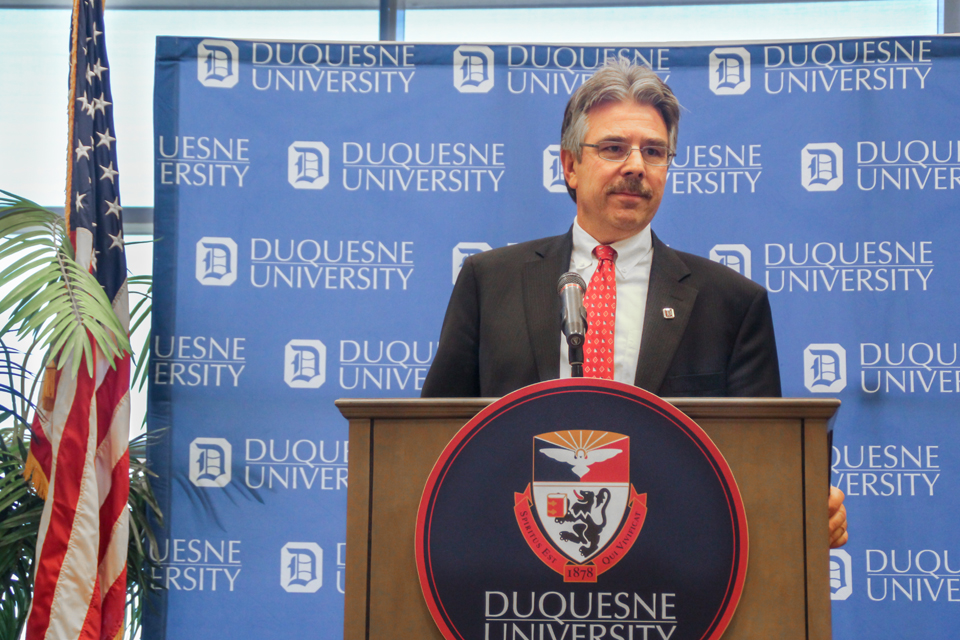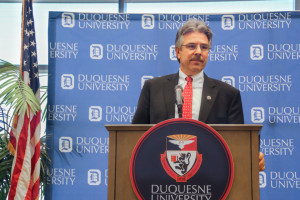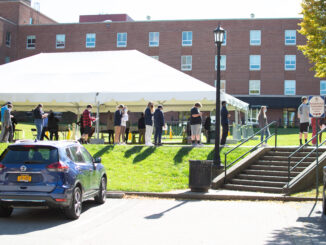

Law school Dean Ken Gormley speaks to the media at a press conference Wednesday morning, where he was named as the next president of Duquesne. Gormley is a Pittsburgh native with more than a decade of experience at the university.
By Julian Routh | Editor-in-Chief
For the 13th time in its 137-year history, Duquesne University will have a new president.
Law school Dean Ken Gormley — an esteemed lawyer, scholar and teacher who has worked at Duquesne since 1994 — will succeed current university President Charles Dougherty on July 1 after Dougherty retires, the university announced Wednesday morning.
“I see this as a moment of great creativity, and it’s exciting for me to be the person who leads Duquesne into the next stage of its upward trajectory,” Gormley said, “taking us into a new era that reflects the energetic and ambitious vision of a university that has been an anchor in this region for over 130 years.”
Gormley, 60, has been at the helm of the law school since March 2010. Under his leadership, the school climbed into the top-tier of law schools in U.S. News and World Report rankings. He also led the largest fundraising campaign in the law school’s history, according to the university.
Marie Milie Jones, chair of the presidential search committee and of Duquesne’s board of directors, said Gormley is well equipped to improve Duquesne academically and financially.
“His academic credentials are exemplary and he’s known throughout the nation as a solid, strong teacher, scholar, author and administrator,” Jones said.
Gormley, a Pittsburgh native, has held several positions of leadership in the city and at Duquesne. He worked on the editorial board of Duquesne University Press from 2001 to 2005 and served as the school’s associate vice president for interdisciplinary scholarship and special projects in 2007 and 2008.
He also served as mayor of Forest Hills, Pennsylvania from 1998 to 2001 and president of the Allegheny County Bar Association, becoming the first academic to hold the position in the organization’s 137-year history.
Using what he called his “irrational Pittsburgh loyalty,” Gormley said he wants use his connections in the region to advance the Duquesne’s standing.
“I’m confident that these lifelong connections … will help me forge relationships that will allow Duquesne to shine more than ever, pushing off from the strong foundation that’s been built during the last two presidencies and even before,” he said.
Dougherty, who will retire June 30, has been president for 15 years. During his presidency, Duquesne has recorded increasing enrollment numbers and its largest endowment ever at more than $260 million, as of February.
The search committee for Dougherty’s successor, formed in February after his retirement announcement, received applications from candidates all over the country, according to Jones. The search was recently narrowed to three final candidates, who met with campus and student leaders last week before the final decision was made.
Student Government Association president John W. Foster, one of the student representatives who met the candidates, said he is confident Gormley can bring fresh perspectives to the university, despite working at Duquesne for so long.
“This is really an exciting time here at the university,” Foster said. “I have so much optimism for [Gormley] and how he can really make sure that Duquesne is well represented not only internally, but also externally.”
A graduate of the University of Pittsburgh and Harvard, Gormley is considered an expert on constitutional law. His work has appeared in several prestigious publications, including The Wall Street Journal, The New York Times and Stanford Law Review. His 2010 book, “The Death of American Virtue: Clinton vs. Starr,” was a New York Times bestseller, and his upcoming book, “The President and the Constitution: A Living History,” is expected to be published in 2016.
In February, Gormley was nominated by Gov. Tom Wolf to fill one of two vacancies on the state Supreme Court, but the nomination died after the other candidate withdrew.
Gormley said he plans to be a familiar face on campus, and that he is looking forward to interacting with students. One of those students is his daughter, Rebecca, a senior corporate communications major who is planning to go to graduate school at Duquesne.
“I’ve seen how much my dad has really improved the law school, so I know that he’ll be able to do that with the university as a whole,” she said.
City and campus leaders also expressed their excitement over Gormley’s upcoming presidency. Pittsburgh Mayor Bill Peduto wrote in a statement that Duquesne choosing Gormley is a “cause for celebration.”
“Ken Gormley is not only a nationally respected academic, but a great supporter of our city, and he will be a tremendous partner as we work together to expand our growing eds-and-meds economy,” Peduto wrote.
Former Pitt Chancellor Mark Nordenberg, a close friend of the law school dean, wrote in a statement that Gormley is committed to Duquesne and Pittsburgh.
“I have no doubt that Ken Gormley will quickly come to be regarded as one of Pittsburgh’s truly exceptional leaders,” Nordenberg wrote.



